Brian Clough: He Wasn't the Best Manager in the Business, But He Was in the Top 1
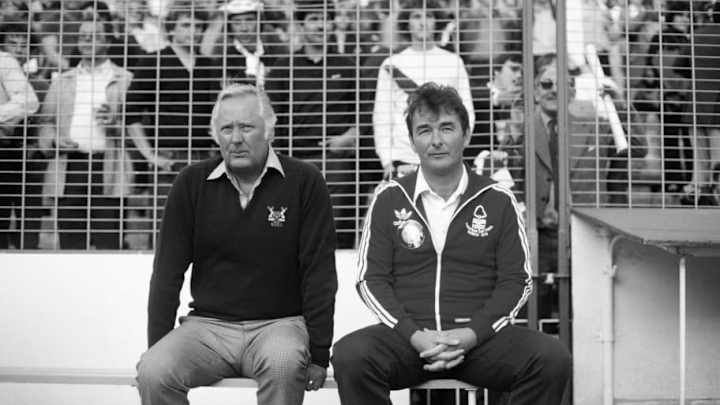
Brian Clough is number 15 in 90min's Top 50 Great Managers of All Time series. Follow the rest of the series over the course of the next three weeks.
When Brian Clough was able to sit back, relax and reflect on a stellar managerial career, he was no doubt a fan of what he'd achieved.
There was a pair of First Division titles to toast, the maverick collecting one apiece with fierce rivals Nottingham Forest and Derby County. Four League Cups had also been delivered to the City Ground during his 18-year tenure as Reds boss, which began with his new club outside of the top-flight.
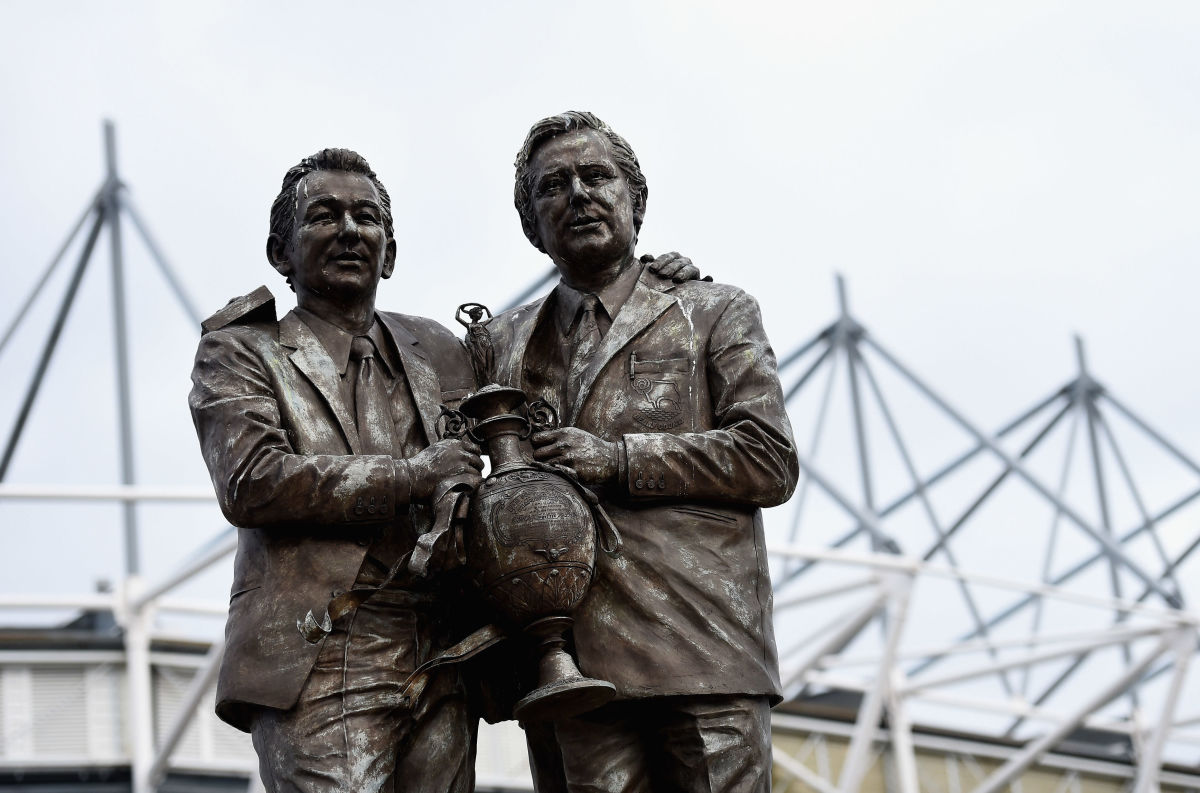
Clough's debut season with Forest was unspectacular, but he led the side to promotion the subsequent campaign and then, remarkably, to the league title in the team's first year back amongst the best.
And yet, being crowned champions of England in 1978 was far from his finest achievement with the Midlands outfit. With the aid of assistant Peter Taylor - who spent much of his life following Clough to jobs across the country - the Yorkshireman secured consecutive European Cups for the club in 1979 and 1980.
"I wouldn't say I was the best manager in the business, but I was in the top one."
- Brian Clough on his coaching career (Guardian)
The Tricky Trees had never previously played in the competition, yet defeated a fearsome Liverpool on their run to glory in Munich, where a Trevor Francis header on the cusp of half-time would sink Malmo.
In the space of two years, Clough had taken Forest from mid-table obscurity in the lower leagues to kings of Europe; no wonder he held himself in such high regard.
Career Honours
Second Division (1969) |
|---|
Watney Cup (1970) |
Texaco Cup (1972) |
First Division (1972, 1978) |
Anglo-Scottish Cup (1977) |
League Cup (1978, 1979, 1989, 1990) |
Manager of the Year (1978) |
FA Charity Shield (1978) |
European Cup (1979, 1980) |
European Coach of the Year (1979) |
European Super Cup (1979) |
European Coach of the Season (1980) |
Full Members Cup (1989, 1992) |
The path to continental supremacy began with a brief stint at Sunderland, where the recently retired striker prepared the youth teams for a future in the game after having his own playing career cruelly ended by a horrific knee injury.
Viewing the role of academy coach as beneath him, Clough took up the managerial vacancy at Fourth Division Hartlepool United at the tender age of 30, bringing Taylor in as his right-hand man. In his own words, 'Old Big 'Ead' didn't fancy the place.
Despite his mild distaste for the area, the Monkey Hangers' new boss worked tooth and nail to revive the ailing club, touring local pubs to raise funds.
Having finished in the bottom two in five of the previous six seasons, there was a slight upturn in the side's fortunes once Clough and Taylor came in, but both were dismissed less than 12 months into their tenure by volatile chairman Ernest Ord. No one bar the latter liked the decision, leading to a boardroom coup that saw Ord ousted and the sacked duo reinstated.
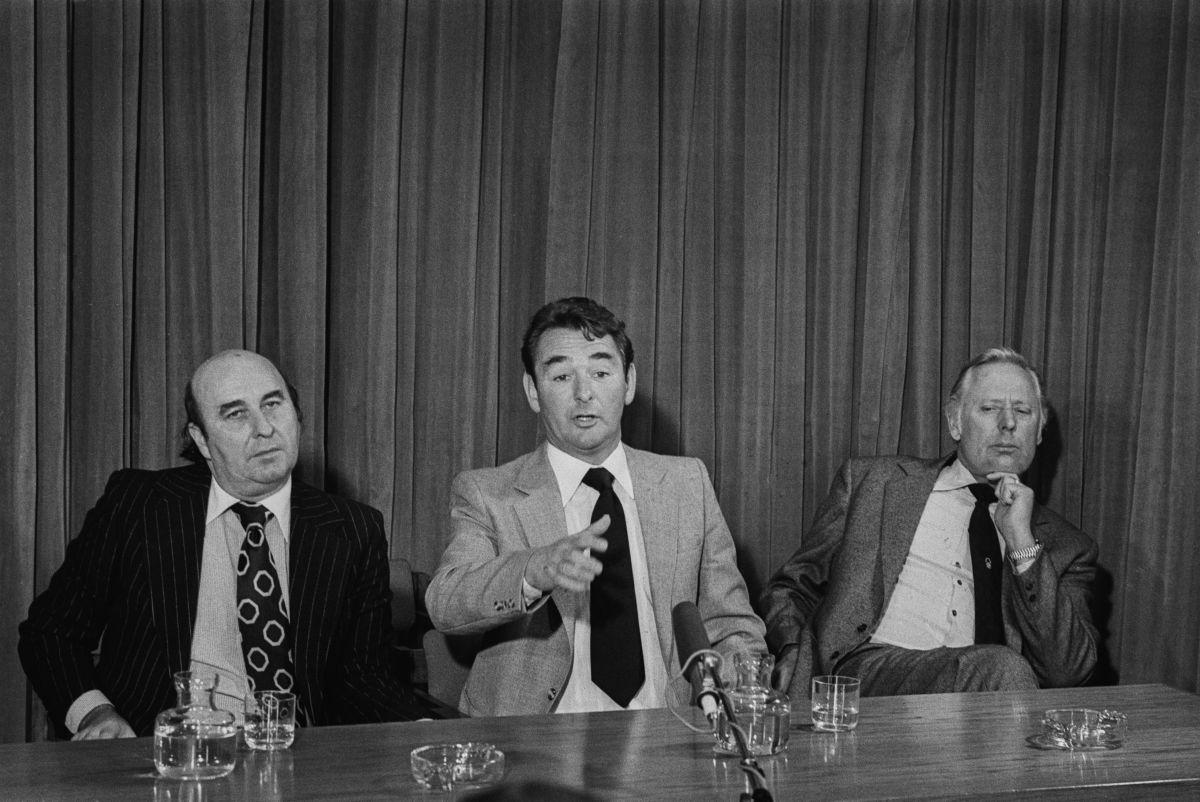
Clough took Pool to a remarkable eighth-place finish in 1967 - the best performance in their history - before he and his trusty assistant left for Derby, who lay two leagues higher.
During his first spell in the east Midlands, the young manager began to garner a reputation as a controversial figure, sacking the club secretary, chief scout and groundsman in his debut season, as well as two tea ladies he had caught sniggering after a Rams defeat.
Teams Managed
Hartlepool United | 1965-1967 |
|---|---|
Derby County | 1967-1973 |
Brighton & Hove Albion | 1973-74 |
Leeds United | 1974 |
Nottingham | 1975-1993 |
After a single campaign, only four of the original 15-strong squad remained, Clough bringing in a number of replacements, including soon-to-be-heroes Roy McFarland, John O'Hare, John McGovern and Alan Hinton.
Derby treaded water in the first year of his reign, but roared to promotion the next as they set a club record of 22 straight victories, whilst also bucking a trend of dirty play to align with their new coach's ethics.
The club would secure their best league finish for nearly a quarter of a century on their return, placing fourth in the First Division, though financial irregularities saw them barred from entering European competition. No worries, Clough would get his taste of continental action soon enough.
A forgettable season followed that one, although the Rams would knock Liverpool off their perch with a 1-0 win on the final day of the following campaign, taking themselves to the summit in the process. A mere point below them lay the Reds, Manchester Cityand Leeds United, all three failing to deny Derby the first English crown of their history.
Ninth position awaited them in 1973, though they would also reach the European Cup semi final, ultimately going down 3-1 to Juventus. However, it wasn't on-field performances that saw the curtain close on Clough and Taylor's time at the Baseball Ground that autumn.
The outspoken manager had a number of issues with his superiors at County, ranging from disagreements over whether he could bring his family on a pre-season tour to his shocking criticism of the supporters after a home loss to Liverpool.
"They started chanting only near the end when we were a goal in front. I want to hear them when we are losing. They are a disgraceful lot."
- Clough on Derby's Fans (Sportskeeda)
So, when he and Taylor handed in their resignations on 15 October - intended to scare the board into providing more funds - the chairmen accepted. Despite his harsh words about them not long prior, the club's fans were furious and demanded that the board resign and their beloved coaches come back. It would change nothing.
The entirety of the backroom staff chose to walk with Clough, following their messiah to third tier Brighton. The Seagulls were far from successful during his eight months at the helm, yet their leading man would be offered one of the biggest jobs in the country after the close of his only season in charge.
Don Revie - fresh from leading Leeds to top flight glory - had accepted the England managerial position, the Whites deciding to gamble and give Clough a go, regardless of his reputation.
The risk didn't pay off. Leeds got the top dog, but Taylor refused to abandon Brighton, an outcome which broke up a brilliant nine-year double act. Without his partner, the incoming boss struggled in the heat of a hostile dressing room.
Billy Bremner - the team's captain and a Revie loyalist - made sure Clough knew he was not welcome at Elland Road. The latter's public criticism of Leeds and their former coach had come back to haunt him.
He had hardly helped himself, taking one of his first training sessions as a chance to announce (as quoted by the Independent) that: "You can all throw your medals in the bin because they were not won fairly."
Clough didn't like their old style of play and the players didn't like him. In many ways, it's amazing he lasted 44 days. On 12 September 1974, the outsider was given his marching orders, a mere six games into his tenure. He won just one of those, leaving the mighty Leeds fourth from bottom and all but out of the title race.
The evening he was dismissed, Cloughie went on television programme 'Calendar' to discuss his brief rule in Yorkshire. Revie was invited, too, and the duo spent much of the run-time arguing with and insulting each other.
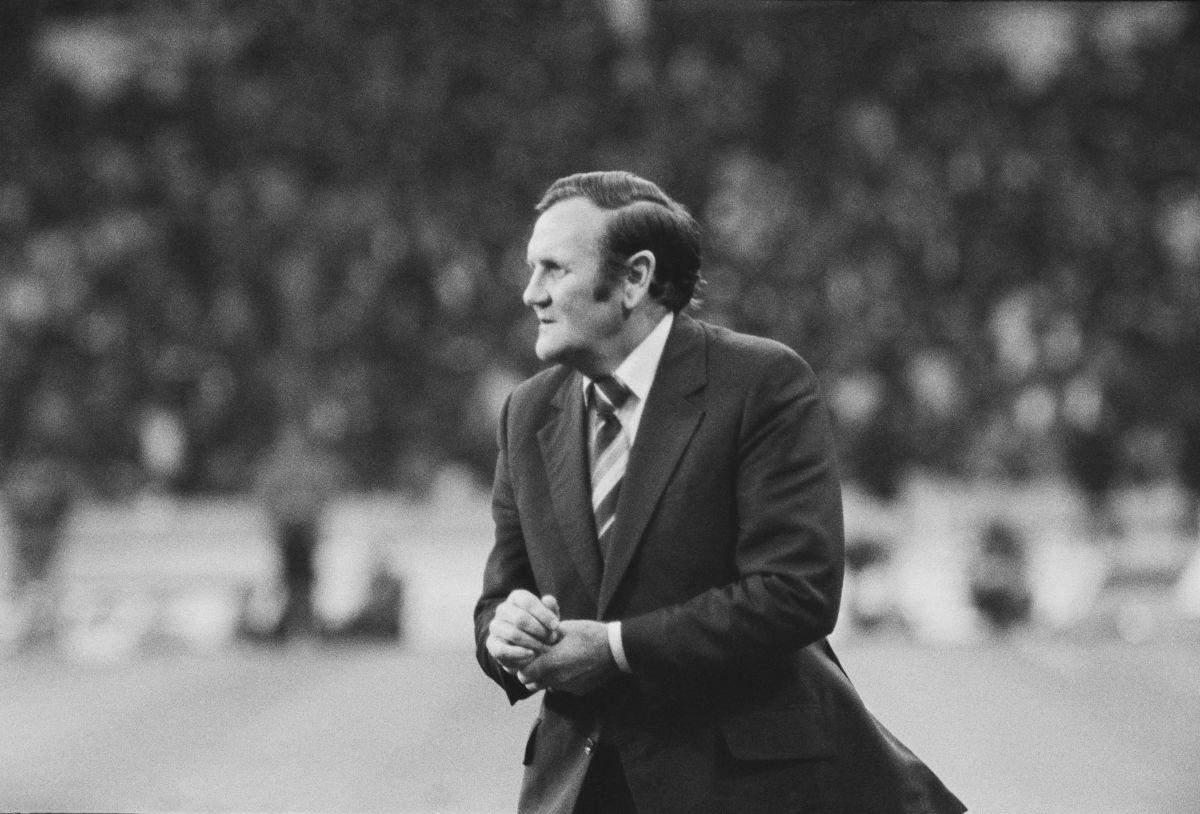
The recently-appointed England manager had worked wonders with United, but his achievements there paled in comparison to what his counterpart would go on to do in Nottingham.
Clough filled the Forest vacancy six days after the turn of the year, the side laying a division below Leeds, who had recovered and risen to mid-table since his exit.
McGovern and Hare renewed their association with the great man, linking up with him at the City Ground, just as they had done several years before at Derby County.
Clough was unable to take the Tricky Trees to promotion during his first campaign, nor could he get them there in his second. However, he was wise enough to apologise to Taylor, eventually convincing him to join his boyhood club as assistant coach.
A REMINDER:#OnThisDay 1979
— Football Remind ⚽️ (@FootballRemind) February 9, 2019
Trevor Francis became the first British £1m player, signing for Nottingham Forest. It was manager Brian Clough’s first signing for 14 months.
Incidentally Clough was late to the unveiling as he was playing squash #NFFC 🔴 pic.twitter.com/dgoL5Vwgdz
It was an inspired decision. Forest held on to the third promotion spot as the 1976/77 season came to a conclusion, their momentum serving them marvellously well once they returned to the top flight.
Birmingham City defender-turned-striker Kenny Burns had a reputation as a heavy drinker and an irresponsible gambler, but Clough and Taylor remained keen on bringing him in. They tracked his movements across the summer leading into the Reds' first year back amongst the best, judging his bad boy image to be overstated.
£150,000 prised him away from St. Andrews. It proved a bargain, Burns performing exquisitely after being reverted back to centre-half. The Scot would be named FWA Player of the Year in May 1977, whilst his employers would reign supreme in England.
Finally, Clough could silence every single one of his doubters. And yet, he wasn't satisfied with delivering what still stands as Forest's only First Division triumph. Even League Cup glory - to make it a historic double - wouldn't dampen his hunger for more.
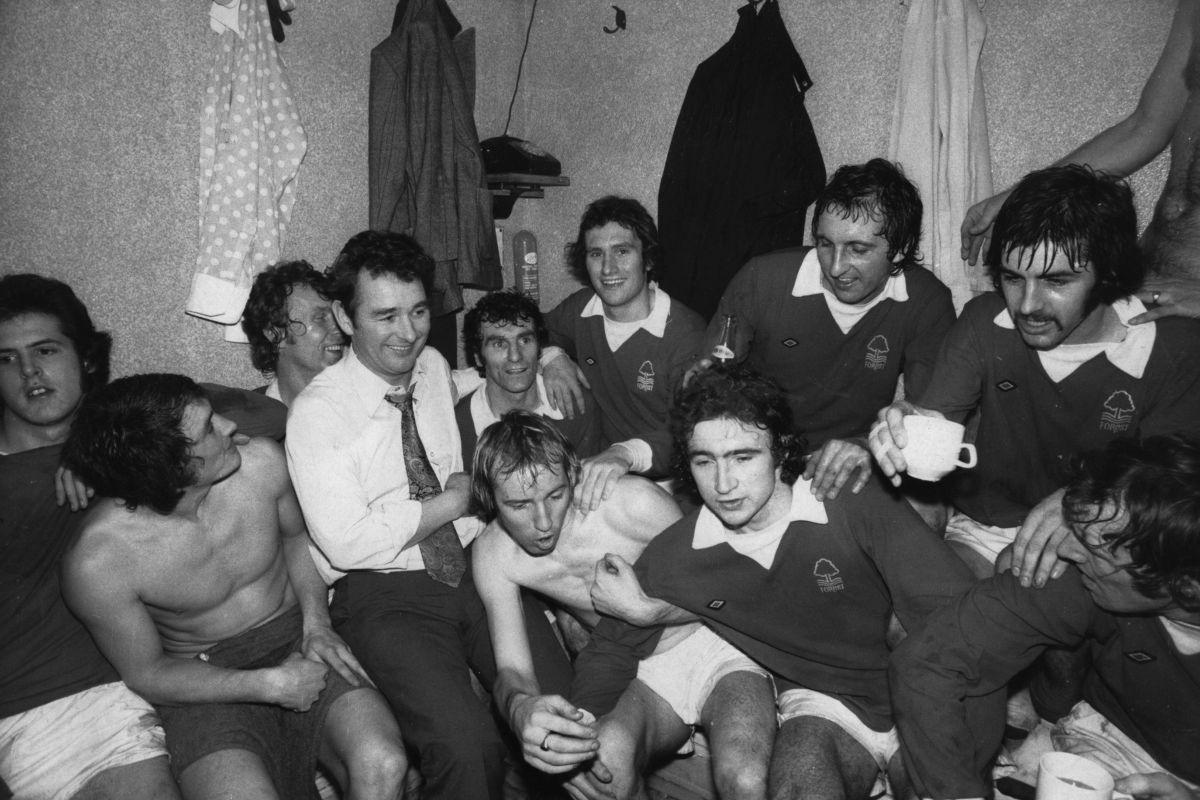
The Community Shield was earned with a 5-0 demolition of Ipswich Town that August, but that was just a taster for what was soon to come. Another Birmingham battler was purchased over the winter, this time forward Francis making the switch and becoming the first £1m footballer on these shores.
On his European debut, Francis nodded the winner against Malmo to guarantee the unthinkable for Forest; they were continental conquerors. Meanwhile, the side successfully defended the League Cup, before continuing their domination in the ensuing 12 months, lifting 'Old Big Ears' once more courtesy of another 1-0 victory.
John Robertson's 20th-minute effort had sunk Hamburg in Madrid, but Forest themselves fell later that Autumn, going out in the first round of the 1980/81 European Cup at the hands of CSKA Sofia.
It is not the case that Clough's powers failed him, but rather that his stellar lineup was slowly dismantled, the Tricky Trees board capitalising on the increased market value of their players to boost finances.
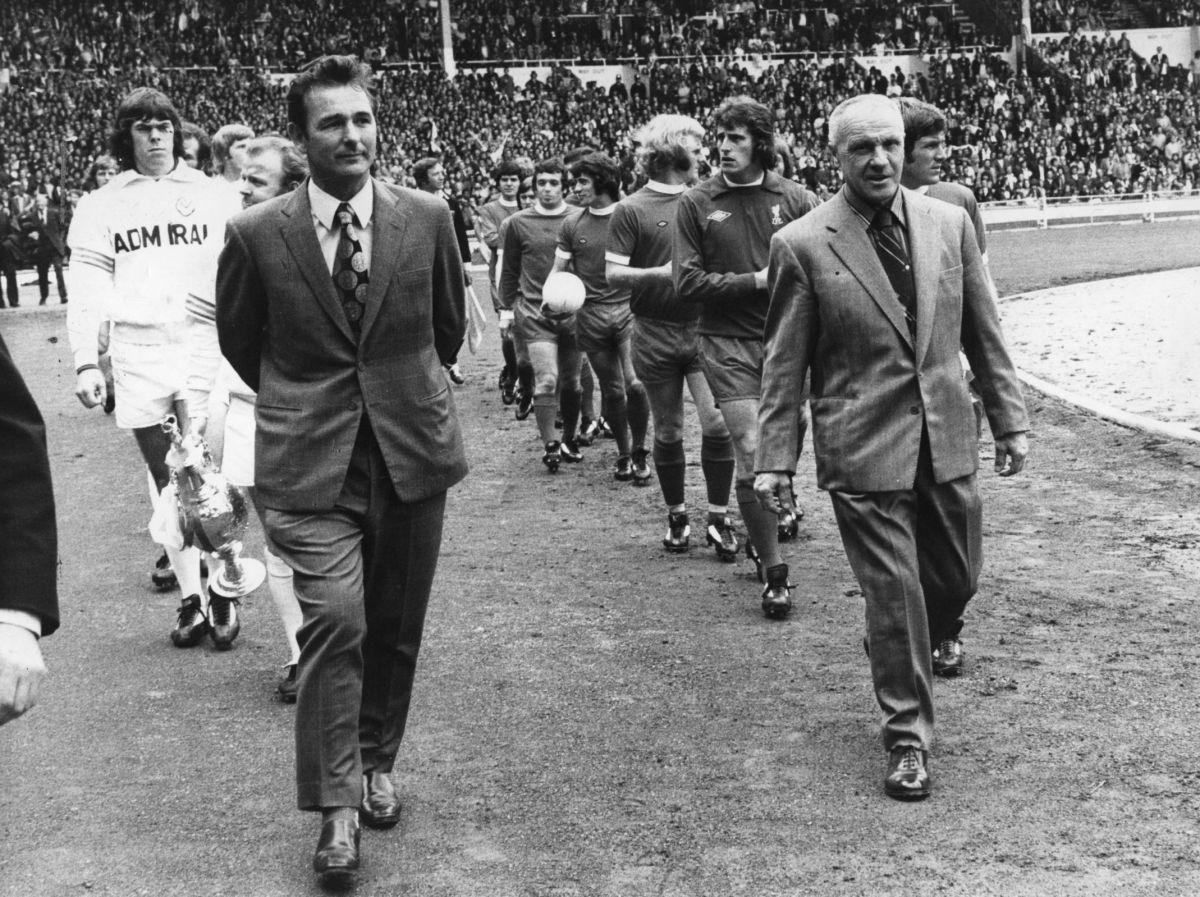
European football still made its way to Nottingham, whilst the side also reached and won numerous major finals, but Clough and his recruits knew they couldn't top what had occurred between 1978 and 1980.
They managed to collect another League Cup in 1989 - with the coach's son Nigel hitting a double in the 3-1 triumph over Luton Town at Wembley - before retaining it one year later. He may not have been able to replicate their success on the continent, but Forest's manager kept them amongst England's finest.
Despite what preceded it, a tragedy of Clough's career is how his friendship with Taylor came to a close. The latter retired from football in 1982 after their relationship had grown increasingly strained, with wicked comments made by both men about their falling out.
However, Forest would be involved in a far greater tragedy not long after. On 15 April 1989, they met Liverpool in an FA Cup semi at Hillsborough. The Merseysiders and English football as a whole would tragically lose 96 supporters that day.
"If his car broke down and I saw him thumbing a lift, I wouldn't pick him up, I'd run him over."
- Clough on Taylor, 1983 (This is Nottingham)
Clough's final years at the helm are overshadowed by his earlier glories and ended with the Reds' Premier League relegation in 1993. The closing seasons are more memorable for corruption allegations and his deteriorating health than on-field glory.
Nevertheless, Forest's demotion does nothing to tarnish the legacy of one of the most remarkable minds in the history of the game. We will never see another human being quite like Brian Clough.
Number 50: Marcelo Bielsa - El Loco's Journey From Argentina to Footballing Immortality in Europe
Number 49: Vic Buckingham - How an Englishman Discovered Johan Cruyff & Pioneered Total Football
Number 48: Claudio Ranieri: A Ridiculed Tinkerman Who Masterminded One of Football's Greatest Ever Achievements
Number 47: Bill Nicholson: Mr Tottenham Hotspur, the First Double Winning Manager of the 20th Century
Number 46: Sven-Goran Eriksson: The Scudetto Winning Shagger Who Never Solved the Lampard-Gerrard Conundrum
Number 45: Sir Alf Ramsey: The Man Behind the 'Wingless Wonders' & England's Sole World Cup Triumph
Number 44: Antonio Conte: An Astute Tactician Whose Perfectionist Philosophy Reinvented the 3-5-2 Wheel
Number 43: Kenny Dalglish: The Beacon of Light in Liverpool's Darkest Hour
Number 42: Massimiliano Allegri: The Masterful Tactician Who Won Serie A Five Times in a Row
Number 41: Sir Bobby Robson: A Footballing Colossus Whose Fighting Spirit Ensured an Immortal Legacy
Number 40: Luis Aragones: Spain's Most Important Manager, the Atleti Rock and the Modern Father of Tiki-Taka
Number 39: Herbert Chapman: One of Football's Great Innovators & Mastermind Behind the 'W-M' Formation
Number 38: Carlos Alberto Parreira: The International Specialist Who Never Shied Away From a Challenge
Number 37: Franz Beckenbauer: The German Giant Whose Playing Career Overshadowed His Managerial Genius
Number 36: Viktor Maslov: Soviet Pioneer of the 4-4-2 & the Innovator of Pressing
Number 35: Rafa Benitez: The Conquerer of La Liga Who Masterminded That Comeback in Istanbul
Number 34: Zinedine Zidane: Cataloguing the Frenchman's Transition From Midfield Magician to Managerial Maestro
Number 33: Luiz Felipe Scolari: How the Enigmatic 'Big Phil' Succeeded as Much as He Failed on the Big Stage
Number 32: Jupp Heynckes: The Legendary Manager Who Masterminded 'the Greatest Bayern Side Ever'
Number 31: Vicente del Bosque: The Unluckiest Manager in the World Who Led Spain to Immortality
Number 30: Arsene Wenger: A Pioneering Who Became Invincible at Arsenal
Number 29: Udo Lattek: The Bundesliga Icon Who Shattered European Records
Number 28: Jock Stein: The Man Who Guided Celtic to Historic Heights & Mentored Sir Alex Ferguson
Number 27: Vittorio Pozzo: Metodo, Mussolini, Meazza & the Difficult Memory of a Two-Time World Cup Winner
Number 26: Jurgen Klopp: The Early Years at Mainz 05 Where He Sealed His 'Greatest Achievement'
Number 25:Mario Zagallo: Habitual World Cup Winner & Sculptor of Brazil's Joga Bonito Era
Number 24: Bela Guttmann: The Dance Instructor Who Changed Football Forever (and Managed...Just Everyone)
Number 23: Valeriy Lobanovskyi: The Scientist Who Dominated Football in the Soviet Union
Number 22: Louis van Gaal: The Stubborn Master Who Won 15 Major Trophies at 4 of the World's Greatest Clubs
Number 21: Otto Rehhagel: The 'King' Who Turned 150/1 Greek Outsiders into Champions of Europe
Number 20: Tele Santana: The 'Joga Bonito' Icon Who Helped Brazil Rediscover Their Love of Football
Number 19: Bill Shankly: The Innovative Motivator Who Rebuilt Liverpool From the Ground Up
Number 18: Ottmar Hitzfeld: The Manager Who Won Absolutely Everything at Germany's 2 Biggest Clubs
Number 17: Miguel Muñoz: The Man Who Told Alfredo Di Stefano to F*ck Off & Led the Ye-Ye's to European Glory
Number 16: Fabio Capello: Italy's Cosmopolitan Disciplinarian Who Built on a Generation-Defining AC Milan
